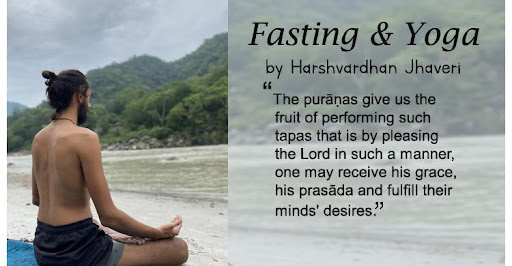Indian culture is an amazing mystery constituting of several rituals and beliefs but if we look closely they do have a profound meaning apart from just being a religious pursuit. Be it taking a holy bath on auspicious days, preparing specific concoctions, or observing fasts we mostly attach them to religious significance. But have we ever wondered how and why they affect us?
It’s been almost a year that on every Monday we see Harshvardhan Jhaveri, an adept yogi who has lived and viewed the disciplined and religious lifestyle comprehensively shares an image of Somvar fasting.
Moreover, Harshvardhan Jhaveri is well acquainted with various subjects of yoga and philosophy and has acquired wisdom from renowned institutes like Yoga University, Kerala, Kaivalyadhama and Chinmaya Mission, therefore we got in touch with him to delve deeper on this subject:
Importance of Fasting and Yoga: With Harshvardhan Jhaveri
hmy: Why fasting is important?
Harshvardhan: All beings need energy to live. We receive this energy from various sources – the sun, ground, air, water and food. They help to perform the functions of the body like growth, repair, protection etc.
Horses, elephants, lions and other animals intuitively know what they should eat. But man usually does not eat what he needs and consumes several kinds of cooked and uncooked foods, does not eat his food well and therefore falls sick due to disease. Therefore we must know what to eat, how to eat, when to, and when not to eat.
Yoga texts like the Haṭha Pradīpikā and Bhagavada Gītā use the term mitāhāra and yuktāhāra which means eating the proper quantity of food and the right food suitable for the body.
A yoga diet would exclude all those food items which are non-vegetarian and intoxicating because food is not only for physical fitness but it also affects the mental and spiritual state of a being.
Many cultures give importance to observing fasts on particular days and periods of religious importance. Modern science inquiries into this and there are many studies today that prove the benefits of holding such fasts. Fasting is tapas – austerity, a method of self-discipline.
Citta śuddhi and śarīra śuddhi. Mental and physical cleansing. Several religions emphasize the importance of fasting as a means of self-purification and to bring the mind to one-pointedness. Fasting is also curative in nature and recuperative for the body’s internal organs as they get a chance to rest.
This gives them more strength, vitality and they can work more efficiently. The body is able to tap into the natural healing power faster during the process of fasting as the process of digestion is halted and the elimination of the mala or ām – the impurities and unwanted material from the body is more active. During a fast one follows what is prescribed only and avoids certain foods. This strengthens the willpower too. There are hundreds of experiments and studies to prove the benefits of fasting but most are limited in their scope to the physical and mental states of a person. The experiences that fasting provides to uncover ones spiritual nature remain with the one who undertakes this kind of tapas.
hmy: How do you identify the term fasting when we stay away from food?
Harshvardhan:
In Sanskrit, the term we use is upavāsa. The meaning is quite different from the word fasting which usually means to abstain from food for a particular period of time. Upavāsa literally means to sit or stay near (God) or to reside in His realm.
The word fast also means to go quickly. But where? Towards the goal of life. God or Self Realisation. It is primarily a spiritual practice.
The processes of cleansing, detoxifying the body, etc are a part of that but the intention of the upavāsa is not that. Upavāsa is tapas. And tapas is one of the three practices of Patañjalis Kriyā Yoga Sādhana. Tapas is to be performed along with Svādhyāya and Īśvara praṇidhāna – Self study (inquiry into the question Who am I?) and Surrender to the Divine. When undertaken in such a manner it leads one quickly to the goal.
Everything is food. Food for the senses. The senses are indulging in their foods. The ears wish to hear good sounds and listen to music that is pleasing. The skin wants to feel, to touch or hold a loved one. The eyes want to see good things. The tongue, enjoy flavors, taste delicious foods and talk. And the nose, smell sweet flowers, perfume and other things pleasing. During upavāsa, the senses too are to be kept in check. The tongue here is given dominance in this process because if one is able to control one’s palate, one can probably control everything else. Even still, the other senses too are to be withdrawn and the mind turned inwards, towards God.
hmy: Do you view it more as a religious duty or spiritual calling?
Harshvardhan:
I feel they are not different. It is both. A religious call and spiritual duty. In the beginning, one may question the practice and call it out as a religious practice and discard the same as they say they are not religious. They may not even try it. Others may still try it as they are spiritually oriented and are looking for new experiences or processes. Some undertake fasts as a challenge or go on diets to achieve some physical or mental goals and in the process, they may gain an insight into life or have an experience that can be transforming for them. Upavāsa is an experiential process. One must try it out first and then decide what it is for themselves.
hmy: What is the significance of Monday fasting?
Harshvardhan:
Monday or Moonday or Somavāra is the dearest to Lord Śiva. He is also known as Someśvara or Somanātha – the Lord of Ceaseless Delight. As tapas, several of his devotees perform upavāsa on that day.
The purāṇas give us the fruit of performing such tapas that is by pleasing the Lord in such a manner, one may receive his grace, his prasāda and fulfill their minds’ desires. It is believed that unmarried women who undertake this fast, following the vidhis and niyamas (rules to observe during the fast) are able to find a suitable man to marry. Somavāra upavāsa when undertaken with a Sankalpa (firm resolve) for a particular period of time becomes a vrata (a vow). This becomes an aid in sādhanā and takes one steadily through life towards the goal of yoga.
One only takes sāttvik food once a day in the evening. Such food promotes longevity, intelligence, health, and happiness. Rājasika and tāmasika dominant food is avoided completely as they give rise to pain, grief, illness, is unwholesome and harmful for the body. The gross part of the food makes up the physical body and the subtle part of it makes up the mind. And as the mind, so the man. Sāttvika food promotes pious and pure thoughts, takes the aspirant to great spiritual heights, and thus the emphasis on it. It is not only limited to Somavāra vrata but a person on the path of yoga is advised to partake of sāttvika dominant food.
hmy: Any message to the young generation that believes in modern intermittent fasting?
Harshvardhan:
I believe it is an age-old practice that has resurfaced with a new name. We find it in many cultures.
The sādhaka is to be an ekabhukti – who eats only once a day. Intermittent fasting differs from this in some ways as there are no restrictions on what to eat and the number of times one can eat in the window period. The method is good and many experts and researchers in modern science have documented the process and the benefits.
My message to all that believe in modern intermittent fasting or any other fasts or diets is to make a deeper inquiry into themselves by asking these questions again and again – Who am I? What am I doing? Why am I doing what I am doing? Where am I going?
Also, there are so many different ways of performing fasts and new diets making the news daily.
It can be confusing and even conflicting as they compete with each other for attention and are backed by science, experts, and testimonials. Who to follow? Read and understand all, perform the research. Think them over. And finally, follow your breath, your body intuitively knows. You just have to access and trust it.
Read More from ‘Chat On The Mat‘
- Drugless Healing For Knee Osteoarthritis: Healthy Knees With Dr. Vineeta Ketkar
- Beyond the Surface: A Deeper Look at Emotions with Fharzana Siraj
- “You Are Never Too Weak and Old.” Breaking Mind Barriers With Dr N Ganesh Rao



